简单句并列句和复合句包括五大句型
简单句、并列句和复合句
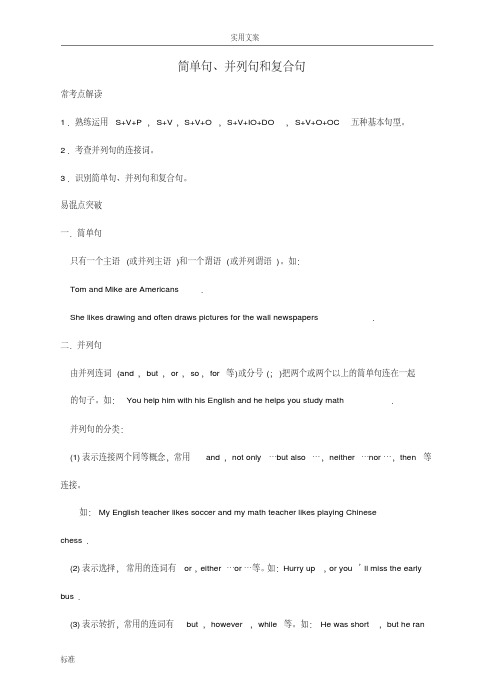
简单句、并列句和复合句常考点解读1.熟练运用S+V+P,S+V,S+V+O,S+V+IO+DO,S+V+O+OC五种基本句型。
2.考查并列句的连接词。
3.识别简单句、并列句和复合句。
易混点突破一.简单句只有一个主语(或并列主语)和一个谓语(或并列谓语)。
如:Tom and Mike are Americans.She likes drawing and often draws pictures for the wall newspapers.二.并列句由并列连词(and,but,or,so,for等)或分号(;)把两个或两个以上的简单句连在一起的句子。
如:You help him with his English and he helps you study math.并列句的分类:(1)表示连接两个同等概念,常用and,not only…but also…,neither…nor…,then等连接。
如:My English teacher likes soccer and my math teacher likes playing Chinesechess.(2)表示选择,常用的连词有or,either…or…等。
如:Hurry up,or you’ll miss the early bus.(3)表示转折,常用的连词有but,however,while等。
如:He was short,but he ranvery fast.(4)表示因果关系,常用的连词有so,for等。
如:He felt bad,so he didn’t go to schoolthis morning.三.复合句复合句指的是含有两个或更多的主谓结构的句子,其中有一个(或更多)主谓结构充当句子某一(些)成分,如主语、宾语、表语、定语、状语、同位语等,主语从句、宾语从句、表语从句、同位语从句、定语从句和状语从旬都属于复合句。
简单句、并列句和复合句包括五大句型
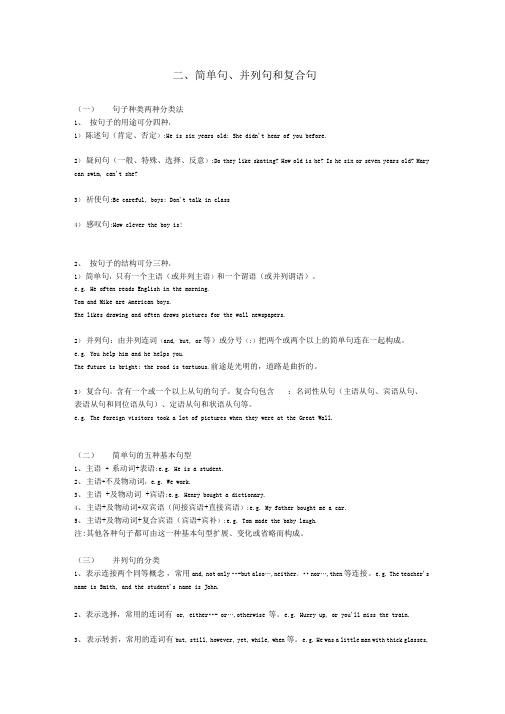
二、简单句、并列句和复合句(一)句子种类两种分类法1、按句子的用途可分四种:1)陈述句(肯定、否定):He is six years old; She didn't hear of you before.2)疑问句(一般、特殊、选择、反意):Do they like skating? How old is he? Is he six or seven years old? Mary can swim, can't she?3)祈使句:Be careful, boys; Don't talk in class4)感叹句:How clever the boy is!2、按句子的结构可分三种:1)简单句:只有一个主语(或并列主语)和一个谓语(或并列谓语)。
e.g. He often reads English in the morning.Tom and Mike are American boys.She likes drawing and often draws pictures for the wall newspapers.2)并列句:由并列连词(and, but, or等)或分号(;)把两个或两个以上的简单句连在一起构成。
e.g. You help him and he helps you.The future is bright; the road is tortuous.前途是光明的,道路是曲折的。
3)复合句:含有一个或一个以上从句的句子。
复合句包含:名词性从句(主语从句、宾语从句、表语从句和同位语从句)、定语从句和状语从句等。
e.g. The foreign visitors took a lot of pictures when they were at the Great Wall.(二)简单句的五种基本句型1、主语+ 系动词+表语:e.g. He is a student.2、主语+不及物动词:e.g. We work.3、主语 +及物动词 +宾语:e.g. Henry bought a dictionary.4、主语+及物动词+双宾语(间接宾语+直接宾语):e.g. My father bought me a car.5、主语+及物动词+复合宾语(宾语+宾补):e.g. Tom made the baby laugh.注:其他各种句子都可由这一种基本句型扩展、变化或省略而构成。
复合从句

不可省略的连词:
介词后的连词不可省略 引导主语从句和同位语从句的连词不可省 略。 That she was chosen made us very happy. We heard the news that our team had won.
主语从句:作句子主语的从句叫主语从句
What he wants to tell us is not clear. 他要跟我们说什么,还不清楚。 Who will win the match is still unknown. 谁能赢得这场比赛还不得而知。 It is known to us how he became a writer. 我们都知道他是如何成为一名作家的。 Where the English evening will be held has not yet been announced. 英语晚会将在哪里举行,还没有宣布。
注意
当主语是reason时,表语从句要用that引导而不 是because。例如: The reason why he was late was that he missed the train by one minute this morning .
同位语从句:
同位语从句说明其前面的名词的具体内容。 同位语从句通常由that引导,that不可省略。 可用于同位语从句的名词有advice、demand、 doubt、fact、hope、idea、information、 message、news、order、problem、promise、 question、request、suggestion、truth、wish、 word等。 The news that we won the game is exciting. 我们赢得这场比赛的消息令人激动。 I have no idea when he will come back home. 我不知道他什么时候回来。
简单句、并列句和复合句的区别
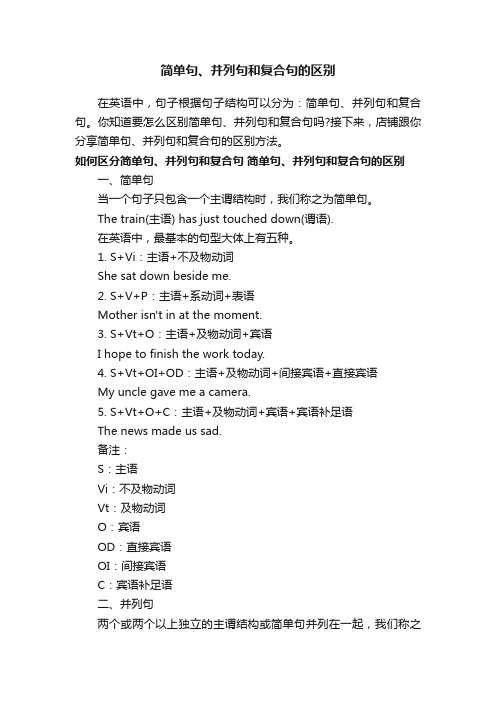
简单句、并列句和复合句的区别在英语中,句子根据句子结构可以分为:简单句、并列句和复合句。
你知道要怎么区别简单句、并列句和复合句吗?接下来,店铺跟你分享简单句、并列句和复合句的区别方法。
如何区分简单句、并列句和复合句简单句、并列句和复合句的区别一、简单句当一个句子只包含一个主谓结构时,我们称之为简单句。
The train(主语) has just touched down(谓语).在英语中,最基本的句型大体上有五种。
1. S+Vi:主语+不及物动词She sat down beside me.2. S+V+P:主语+系动词+表语Mother isn't in at the moment.3. S+Vt+O:主语+及物动词+宾语I hope to finish the work today.4. S+Vt+OI+OD:主语+及物动词+间接宾语+直接宾语My uncle gave me a camera.5. S+Vt+O+C:主语+及物动词+宾语+宾语补足语The news made us sad.备注:S:主语Vi:不及物动词Vt:及物动词O:宾语OD:直接宾语OI:间接宾语C:宾语补足语二、并列句两个或两个以上独立的主谓结构或简单句并列在一起,我们称之为并列句。
各个简单句间是平行并列的关系,而非从属关系。
并列句的各个分句间可用逗号、分号、起连接作用的副词或并列连接词来连接。
1. 能连接并列句的连词and(和,又),but(但是),for(因为),however(然而),or(或者),so(所以,因而),while(然而),yet(然而)2. 能连接并列句的复合连词or else(否则,要不然),either...or...(要么···,要么···;或者···,或者···),neither...nor...(既不···,也不···),not only...but also(不仅···,而且···)3. 能连接并列句的副词besides(而且,还有),hence(因此),otherwise(否则,要不然),then(然后,于是),therefore(因此,所以),thus(因而,从而) 根据并列分句之间的不同关系,并列句则可以分为以下四种。
英语几大句型
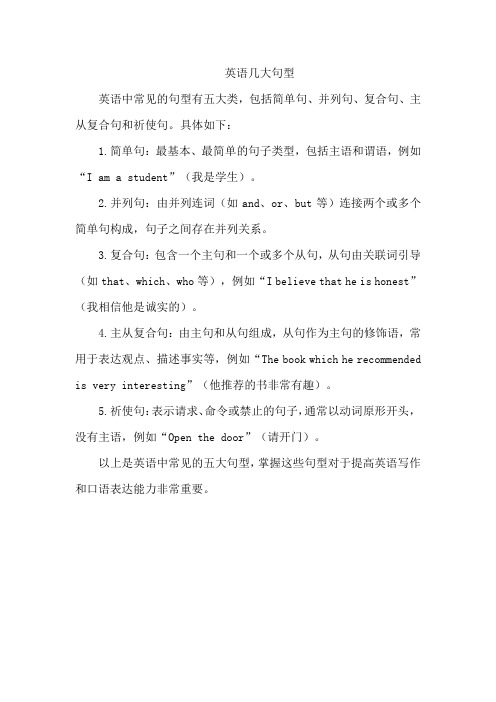
英语几大句型
英语中常见的句型有五大类,包括简单句、并列句、复合句、主从复合句和祈使句。
具体如下:
1.简单句:最基本、最简单的句子类型,包括主语和谓语,例如“I am a student”(我是学生)。
2.并列句:由并列连词(如and、or、but等)连接两个或多个简单句构成,句子之间存在并列关系。
3.复合句:包含一个主句和一个或多个从句,从句由关联词引导(如that、which、who等),例如“I believe that he is honest”(我相信他是诚实的)。
4.主从复合句:由主句和从句组成,从句作为主句的修饰语,常用于表达观点、描述事实等,例如“The book which he recommended is very interesting”(他推荐的书非常有趣)。
5.祈使句:表示请求、命令或禁止的句子,通常以动词原形开头,没有主语,例如“Open the door”(请开门)。
以上是英语中常见的五大句型,掌握这些句型对于提高英语写作和口语表达能力非常重要。
简单句的五种基本句型

简单句的五种基本句型一、句子分为简单句、并列句和复合句。
①简单句的基本形式是由一个主语加一个谓语构成,其它各种句子形式都是由此句型发展而来。
②并列句是由两个或两个以上的简单句用并列连词连在一起构成的句子。
并列连词有:and,but, or, so等。
③复合句是由主句+从句构成.由从属连词连接,如because, if, when, while, until, after, before, as soon as等。
分为名词性从句,形容词性从句(即定语从句),副词性从句(即状语从句)三大类。
其中最著名的是宾语从句,定语从句和状语从句。
二、简单句的五个基本句式:①主谓②主谓宾③主谓双宾④主谓宾补⑤主系表主语: 句子说明的人或事物.谓语:说明主语的动作、状态和特征。
表语:系动词之后的成分,表示主语的性质、状态和特征。
宾语:1。
动作的承受者——动宾。
2. 介词后的名词、代词和动名词-—介宾.补语:宾补,对宾语的补充。
主补,对主语的补充.判断下列句子是那种结构:1. He is swimming.2。
It made him angry。
3. The little boy is asking the teacher questions.4. She is young。
5。
My mom bought me a beautiful gift.6. He kept his eyes closed.7。
He told us an exciting story.8. We must keep our classroom tidy and clean。
9. I heard the baby crying in the sitting room。
10.Can you push the window open?11. He seemed tired。
1.主谓 2。
主谓宾补 3。
主谓双宾 4。
主系表 5。
主谓双宾 6。
主谓宾补 7。
五大基本句子结构
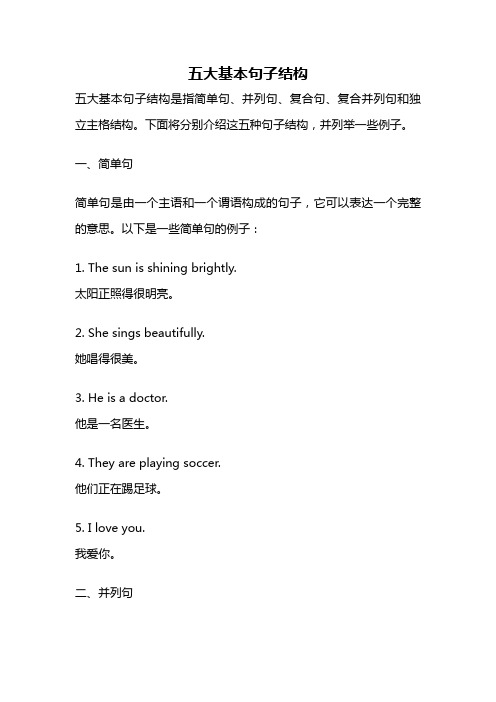
五大基本句子结构五大基本句子结构是指简单句、并列句、复合句、复合并列句和独立主格结构。
下面将分别介绍这五种句子结构,并列举一些例子。
一、简单句简单句是由一个主语和一个谓语构成的句子,它可以表达一个完整的意思。
以下是一些简单句的例子:1. The sun is shining brightly.太阳正照得很明亮。
2. She sings beautifully.她唱得很美。
3. He is a doctor.他是一名医生。
4. They are playing soccer.他们正在踢足球。
5. I love you.我爱你。
二、并列句并列句是由两个或多个简单句通过连词连接而成的句子,它们之间的关系是并列的。
以下是一些并列句的例子:1. I like to read books, and my sister likes to watch movies.我喜欢读书,我妹妹喜欢看电影。
2. He is tall, but his brother is short.他很高,但他的兄弟很矮。
3. She is a good student, so she always gets good grades.她是一个好学生,所以她总是得到好成绩。
4. I want to go to the beach, or maybe the mountains.我想去海滩,或者可能是山区。
5. He is a doctor, and she is a nurse.他是一名医生,她是一名护士。
三、复合句复合句是由一个主句和一个或多个从句构成的句子,从句可以是名词从句、形容词从句或副词从句。
以下是一些复合句的例子:1. I know that he is coming.我知道他要来了。
2. She is happy because she got a promotion.她很高兴,因为她得到了晋升。
3. He left early so that he could catch the train.他早早离开,以便赶上火车。
初中英语五大基本句型
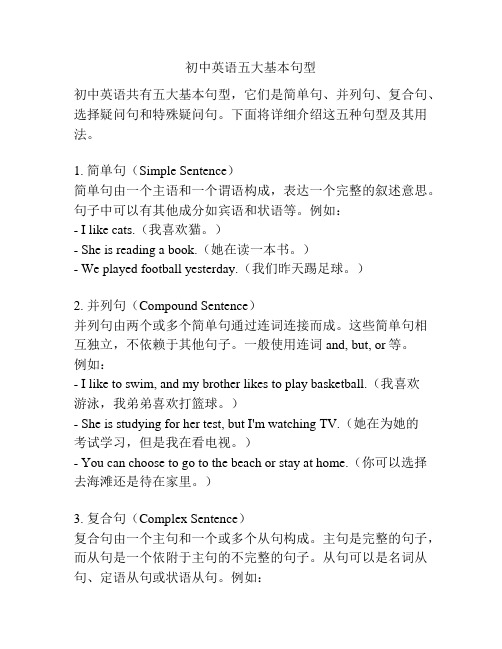
初中英语五大基本句型初中英语共有五大基本句型,它们是简单句、并列句、复合句、选择疑问句和特殊疑问句。
下面将详细介绍这五种句型及其用法。
1. 简单句(Simple Sentence)简单句由一个主语和一个谓语构成,表达一个完整的叙述意思。
句子中可以有其他成分如宾语和状语等。
例如:- I like cats.(我喜欢猫。
)- She is reading a book.(她在读一本书。
)- We played football yesterday.(我们昨天踢足球。
)2. 并列句(Compound Sentence)并列句由两个或多个简单句通过连词连接而成。
这些简单句相互独立,不依赖于其他句子。
一般使用连词and, but, or等。
例如:- I like to swim, and my brother likes to play basketball.(我喜欢游泳,我弟弟喜欢打篮球。
)- She is studying for her test, but I'm watching TV.(她在为她的考试学习,但是我在看电视。
)- You can choose to go to the beach or stay at home.(你可以选择去海滩还是待在家里。
)3. 复合句(Complex Sentence)复合句由一个主句和一个或多个从句构成。
主句是完整的句子,而从句是一个依附于主句的不完整的句子。
从句可以是名词从句、定语从句或状语从句。
例如:- I know that she is coming to visit us tomorrow.(我知道她明天要来看我们。
)- The book that I borrowed from the library is very interesting.(我从图书馆借的那本书很有趣。
)- We will go to the park if it doesn't rain tomorrow.(如果明天不下雨,我们会去公园。
简单句、并列句和复合句

简单句、并列句和复合句句子按结构可分为简单句、并列句和复合句。
复合句中包含宾语从句、状语从句或定语从句等。
◆一简单句简单句就是只包含一个主谓结构的句子,其句式结构主要有五种:①主 + 谓。
He works in a big company. 他在一家大公司工作。
②主 + 系 + 表。
She is a kind girl. 她是一个善良的女孩。
③主 + 谓 + 宾。
Ann eats junk food twice a week .安一周吃两次垃圾食品。
④主 + 谓 + 间宾 + 直宾。
He gave me a pen .他给我一支钢笔。
⑤主 + 谓 + 宾 + 宾补。
He kept me waiting for two hours .他让我等了两小时。
◆二并列句并列句由两个或两个以上的简单句连接而成。
并列句中的各简单句同等重要,没有从属关系,是并列的关系,之间用并列连词连接。
1. 表示顺承的并列连词有and / not only …but (also)等。
如:She not only gaveus a lot of advice, butalso helped us to overcome difficulties .他不仅给了我们很多建议,而且还帮助我们克服困难。
2. 表示选择的并列连词有or,either …or …等。
如:Either you or Maria will haveto go .你或玛丽亚得去一趟。
3. 表示转折的并列连词有but,yet,however 等。
如:It is hot in summer here , butit’s not cold in winter .这里夏天热,但冬天不冷。
4. 表示因果关系的并列连词有so,如:He works hard , so he is one of the topstudents in our class .因为他学习努力,所以他是我们班最优秀的学生之一。
英语五种基本句式
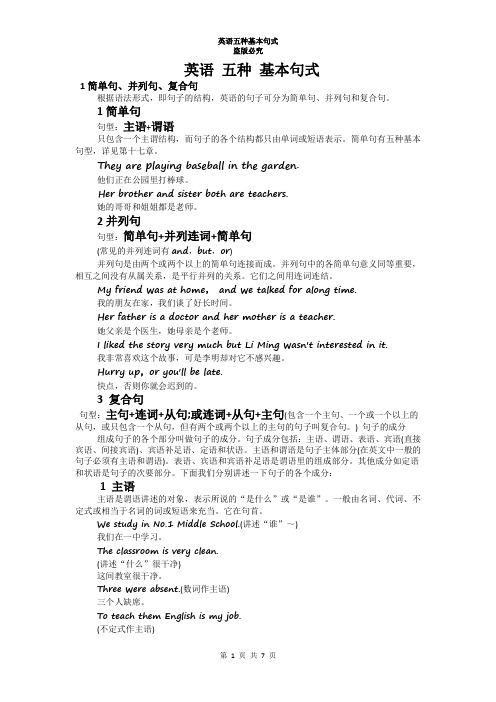
英语五种基本句式1简单句、并列句、复合句根据语法形式,即句子的结构,英语的句子可分为简单句、并列句和复合句。
1简单句句型:主语+谓语只包含一个主谓结构,而句子的各个结构都只由单词或短语表示。
简单句有五种基本句型,详见第十七章。
They are playing baseball in the garden.他们正在公园里打棒球。
Her brother and sister both are teachers.她的哥哥和姐姐都是老师。
2并列句句型:简单句+并列连词+简单句(常见的并列连词有and,but,or)并列句是由两个或两个以上的简单句连接而成。
并列句中的各简单句意义同等重要,相互之间没有从属关系,是平行并列的关系。
它们之间用连词连结。
My friend was at home, and we talked for along time.我的朋友在家,我们谈了好长时间。
Her father is a doctor and her mother is a teacher.她父亲是个医生,她母亲是个老师。
I liked the story very much but Li Ming wasn't interested in it.我非常喜欢这个故事,可是李明却对它不感兴趣。
Hurry up,or you'll be late.快点,否则你就会迟到的。
3 复合句句型:主句+连词+从句;或连词+从句+主句(包含一个主句、一个或一个以上的从句,或只包含一个从句,但有两个或两个以上的主句的句子叫复合句。
) 句子的成分组成句子的各个部分叫做句子的成分。
句子成分包括:主语、谓语、表语、宾语(直接宾语、间接宾语)、宾语补足语、定语和状语。
主语和谓语是句子主体部分(在英文中一般的句子必须有主语和谓语)。
表语、宾语和宾语补足语是谓语里的组成部分。
其他成分如定语和状语是句子的次要部分。
下面我们分别讲述一下句子的各个成分:1 主语主语是谓语讲述的对象,表示所说的“是什么”或“是谁”。
简单句,并列句,复合句
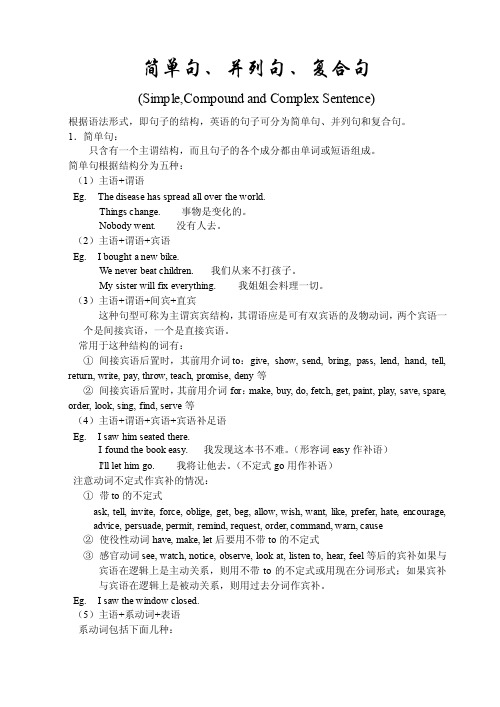
简单句、并列句、复合句(Simple,Compound and Complex Sentence)根据语法形式,即句子的结构,英语的句子可分为简单句、并列句和复合句。
1.简单句:只含有一个主谓结构,而且句子的各个成分都由单词或短语组成。
简单句根据结构分为五种:(1)主语+谓语Eg. The disease has spread all over the world.Things change. 事物是变化的。
Nobody went. 没有人去。
(2)主语+谓语+宾语Eg. I bought a new bike.We never beat children. 我们从来不打孩子。
My sister will fix everything. 我姐姐会料理一切。
(3)主语+谓语+间宾+直宾这种句型可称为主谓宾宾结构,其谓语应是可有双宾语的及物动词,两个宾语一个是间接宾语,一个是直接宾语。
常用于这种结构的词有:①间接宾语后置时,其前用介词to:give, show, send, bring, pass, lend, hand, tell, return, write, pay, throw, teach, promise, deny等②间接宾语后置时,其前用介词for:make, buy, do, fetch, get, paint, play, save, spare, order, look, sing, find, serve等(4)主语+谓语+宾语+宾语补足语Eg. I saw him seated there.I found the book easy. 我发现这本书不难。
(形容词easy作补语)I'll let him go. 我将让他去。
(不定式go用作补语)注意动词不定式作宾补的情况:①带to的不定式ask, tell, invite, force, oblige, get, beg, allow, wish, want, like, prefer, hate, encourage, advice, persuade, permit, remind, request, order, command, warn, cause②使役性动词have, make, let后要用不带to的不定式③感官动词see, watch, notice, observe, look at, listen to, hear, feel等后的宾补如果与宾语在逻辑上是主动关系,则用不带to的不定式或用现在分词形式;如果宾补与宾语在逻辑上是被动关系,则用过去分词作宾补。
高考英语语法复习 简单句并列句复合句

常用并列连词 coordinating conjunctions
表联合的连词 and, when(=and just at this time就在这时) 表转折或对比的连词:but(但是,可是), while(而,却), yet(可是 表选择的连词: or(或者, 还是;否则), otherwise(要不然)等。 表因果的连词: for(因为), so(因此)等
(1) therefore → so 因therefore只能做副词, 不能作为连词连接两个句子;或在 therefore前加and。
(2) and → or 因either…or 是固定搭配。
9. As the lecture is uninteresting and dull, so more and more listeners began to leave. 去掉so 因前面已有连词As (因为)了,就不再用 连词了。
高考英语语法复习 简 单句并列句复合句
简单句的五种基本句型
• 主语 + 不及物动词 ( S + Vi ) • 主语 + 及物动词 +宾语 ( S + Vt + O) • 主语 + 系动词 + 表 (S + LV + predicative) • 主语+双宾动词+间宾+直宾(S +Vt +O.indir+O. dir) • 主语 + 宾补动词 +宾语 +宾语补语
(1) and → but 根据句子意思,前后是转折关系,用but。 (2) 在she moved之前加上so 这两个句子之间缺少连词,而且 “返回”是“不适应”的结果,引出结果的分句用so(因此)。
8. I will be free all the weekend, therefore, either Saturday and Sunday is OK.
简单句、并列句和复合句讲解与练习精选全文

e.g. He is a student. The dish tastes delicious. 注:其他各种句子都可由这几种基本句型扩展、变化或省略而构成。
简单句、并列句和复合句
二、并列句:由__并__列___连词(_a_n_d_,_b_u_t_,_o_r_等_)或_分__号__(___;__)_把两个或两个以上
I’m busy, so I can’t go with you.
三、复合句:
简单句、并列句和复合句
包含两个或多个主谓结构,并且,其中一个主谓结构充当主句,另一个或多个主谓结构为从句,
充当该主句的__主___语、___宾___语、__表___语、__同__位___语、_定____语或__状___语,这样的句子叫
简单句、并列句和复合句
(一)简单句的五种基本句型
1、_主___语___+__谓__语___ (vi.)
e.g. The car is running fast. They worked day and night.
2、_主___语___+__谓__语___ (vt.) +__宾__语___
e.g. Henry bought a dictionary. We can play the piano.
【高考考点】 1、简单句的五大句型是最基本的句型。虽然近几年单纯考查这种基础句型的题 不多,但是在阅读中有时需借助于划分句子成分去理解,在书面表达中,没有最 基本的遣词造句的能力是不可能用地道的英语句子来表达清楚的。 2、高考对简单句、并列句和各种复合句的考查常表现在对连词的选择和使用上 。如:and, but, or, while以及其它连接名词性从句、定语从句和状语从句的连接 词、关联词。 3、各种主从复合句的考查常常与动词的时态联系在一起,以宾语从句与状语从 句最为明显,时间从句与条件从句中,如果主句是将来时,从句则用一般式表将 来,这一点在高考中经常考查。 如:We will go outing if it doesn’t rain tomorrow。
句子基本句型结构句子按其结构可分为简单句

句子基本句型结构句子按其结构可分为简单句、并列句和复合句。
一、简单句基本形式:简单句的基本形式是由一个主语加一个谓语构成。
其它各种句子形式都是由此句型发展而来,如五大基本句型:1.主+谓这种句型简称为主谓结构,其谓语一般都是不及物动词,例:Things change.事物是变化的。
Nobody went.没有人去。
--Did you go by sea?你们走的是海路吗?--NO,we flew.不,我们是飞去。
2.主+联系动词+表这种句型称为主系表结构,其实联系动词在形式上也是一种谓语动词,但实质上表语成了谓语,例:Mr. Turner is an artist.特纳先生是位画家。
3.主+谓+宾这种句型可称为主谓宾结构,它的谓语一般多是及物动词,例:We never beat children.我们从来不打孩子。
4.主+谓+宾+宾这种句型可称为主谓宾宾结构,其谓语应是可有双宾语的及物动词,两个宾语一个是间接宾语,一个是直接宾语,例:He gave the book to his sister.他把这本书给了他的妹妹。
5.主+谓+宾+宾补这种句型可简称为主谓宾补结构,其补语是宾语补语,与宾语一起即构成复合宾语,例:I found the book easy.我发现这本书不难。
(形容词easy作补语)I'll let him go.我将让他去。
(不定式go用作补语)注意:有时两个或更多的并列主语拥有一个共同的谓语,甚至并列有两个主语和两个谓语,这样的句子仍然是简单句,例:China and other countries in the east Asia are developing rapidly.中国和东亚其它国家正在迅速地发展。
(China and other countries并列主语)Mr. Wang and I often work together and help each other.王先生和我常在一起工作互相帮助。
简单句的五种基本句型,并列句及复合句
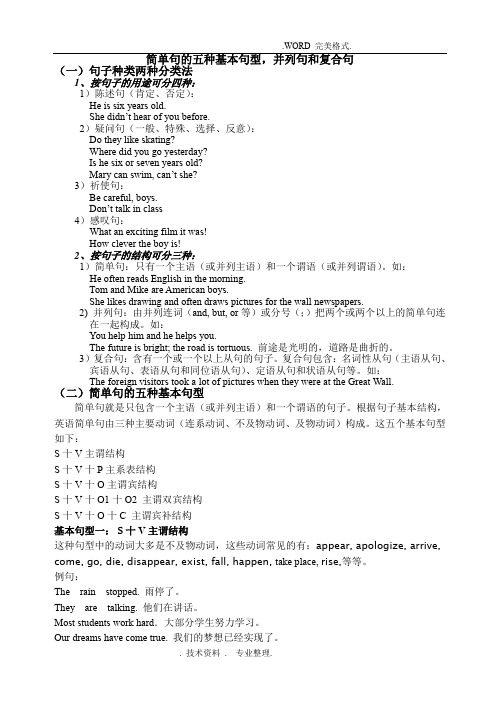
简单句的五种基本句型,并列句和复合句(一)句子种类两种分类法1、按句子的用途可分四种:1)陈述句(肯定、否定):He is six years old.She didn’t hear of you before.2)疑问句(一般、特殊、选择、反意):Do they like skating?Where did you go yesterday?Is he six or seven years old?Mary can swim, can’t she?3)祈使句:Be careful, boys.Don’t talk in class4)感叹句:What an exciting film it was!How clever the boy is!2、按句子的结构可分三种:1)简单句:只有一个主语(或并列主语)和一个谓语(或并列谓语)。
如:He often reads English in the morning.Tom and Mike are American boys.She likes drawing and often draws pictures for the wall newspapers.2) 并列句:由并列连词(and, but, or等)或分号(;)把两个或两个以上的简单句连在一起构成。
如:You help him and he helps you.The future is bright; the road is tortuous. 前途是光明的,道路是曲折的。
3)复合句:含有一个或一个以上从句的句子。
复合句包含:名词性从句(主语从句、宾语从句、表语从句和同位语从句)、定语从句和状语从句等。
如:The foreign visitors took a lot of pictures when they were at the Great Wall.(二)简单句的五种基本句型简单句就是只包含一个主语(或并列主语)和一个谓语的句子。
简单句并列句和复合句包括五大句型

简单句并列句和复合句包括五大句型文稿归稿存档编号:[KKUY-KKIO69-OTM243-OLUI129-G00I-FDQS58-二、简单句、并列句和复合句(一)句子种类两种分类法1、按句子的用途可分四种:1)陈述句(肯定、否定):He is six years old; She didn't hear of you before.2)疑问句(一般、特殊、选择、反意):Do they like skating? How old is he? Is he six or seven years old? Mary can swim, can't she?3)祈使句:Be careful, boys; Don't talk in class4)感叹句:How clever the boy is!2、按句子的结构可分三种:1)简单句:只有一个主语(或并列主语)和一个谓语(或并列谓语)。
e.g. He often reads English in the morning.Tom and Mike are American boys.She likes drawing and often draws pictures for the wall newspapers.2) 并列句:由并列连词(and, but, or等)或分号(;)把两个或两个以上的简单句连在一起构成。
e.g. You help him and he helps you.The future is bright; the road is tortuous. 前途是光明的,道路是曲折的。
3)复合句:含有一个或一个以上从句的句子。
复合句包含:名词性从句(主语从句、宾语从句、表语从句和同位语从句)、定语从句和状语从句等。
e.g. The foreign visitors took a lot of pictures when they were at the Great Wall.(二)简单句的五种基本句型1、主语+系动词+表语:e.g. He is a student.2、主语+不及物动词:e.g. We work.3、主语+及物动词+宾语:e.g. Henry bought a dictionary.4、主语+及物动词+双宾语(间接宾语+直接宾语):e.g. My father bought me a car.5、主语+及物动词+复合宾语(宾语+宾补):e.g. Tom made the baby laugh.注:其他各种句子都可由这一种基本句型扩展、变化或省略而构成。
(完整版)简单句、并列句和复合句(包括五大句型)重要
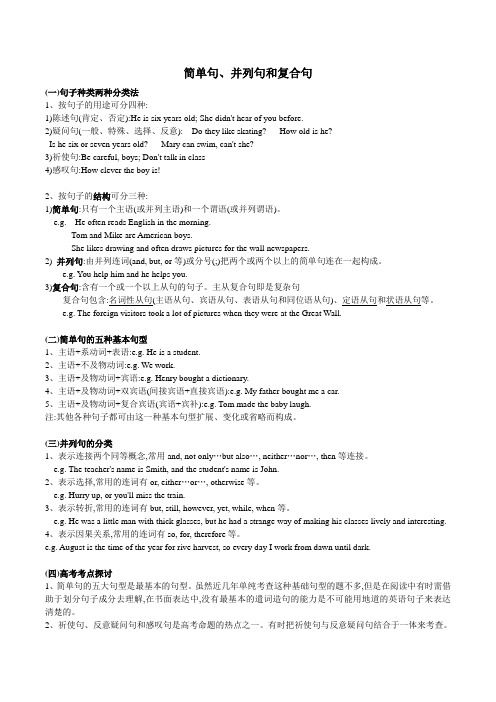
简单句、并列句和复合句(一)句子种类两种分类法1、按句子的用途可分四种:1)陈述句(肯定、否定):He is six years old; She didn't hear of you before.2)疑问句(一般、特殊、选择、反意): Do they like skating? How old is he?Is he six or seven years old? Mary can swim, can't she?3)祈使句:Be careful, boys; Don't talk in class4)感叹句:How clever the boy is!2、按句子的结构可分三种:1)简单句:只有一个主语(或并列主语)和一个谓语(或并列谓语)。
e.g. He often reads English in the morning.Tom and Mike are American boys.She likes drawing and often draws pictures for the wall newspapers.2) 并列句:由并列连词(and, but, or等)或分号(;)把两个或两个以上的简单句连在一起构成。
e.g. You help him and he helps you.3)复合句:含有一个或一个以上从句的句子。
主从复合句即是复杂句复合句包含:名词性从句(主语从句、宾语从句、表语从句和同位语从句)、定语从句和状语从句等。
e.g. The foreign visitors took a lot of pictures when they were at the Great Wall.(二)简单句的五种基本句型1、主语+系动词+表语:e.g. He is a student.2、主语+不及物动词:e.g. We work.3、主语+及物动词+宾语:e.g. Henry bought a dictionary.4、主语+及物动词+双宾语(间接宾语+直接宾语):e.g. My father bought me a car.5、主语+及物动词+复合宾语(宾语+宾补):e.g. Tom made the baby laugh.注:其他各种句子都可由这一种基本句型扩展、变化或省略而构成。
英语五大基本句型(句子结构分析)
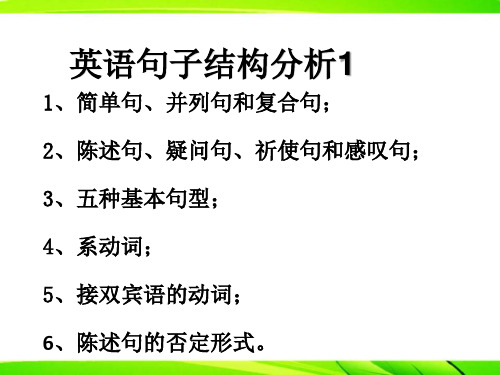
3. 主+谓+宾(S+V+O)
I like English.
Tom has a baseball.
I lost my ID card. She reads books.
4. 主+谓+间宾+直宾(S+V+o+O)
I give him a pen. I give a pen to him.
I buy him a pen. I buy a pen for him.
七给(give, pass, lend, write, show, send, hand)、
带(bring) +to。即vt. + sth. + to + sb.
buy(买)、draw(画)、make”(制作)+for
即vt. + sth. + for + sb.
口诀:七“给”一“带”to不少,
“买”“画”“制作”for来了
肯定形式 1. 主+谓(S+V)
I work. I work very hard. It rains. It rains heavily. She is coming. 2. 主+谓+表(S+V+P) I am a student. The boy is from China. It looks nice. 常见的系动词:be动词; look, seem, feel, smell, sound, taste; keep, stay等。
5. 主+谓+宾+宾补(S+V+O+C) She makes me cry. She asks me to help her.
英语三大基本句型
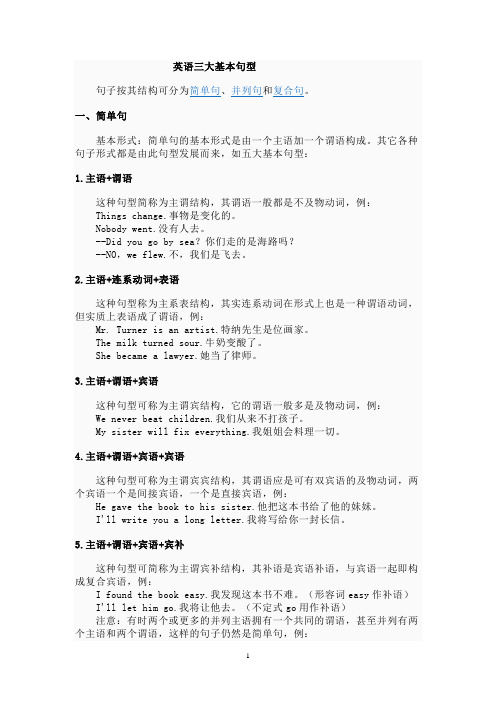
英语三大基本句型句子按其结构可分为简单句、并列句和复合句。
一、简单句基本形式:简单句的基本形式是由一个主语加一个谓语构成。
其它各种句子形式都是由此句型发展而来,如五大基本句型:1.主语+谓语这种句型简称为主谓结构,其谓语一般都是不及物动词,例:Things change.事物是变化的。
Nobody went.没有人去。
--Did you go by sea?你们走的是海路吗?--NO,we flew.不,我们是飞去。
2.主语+连系动词+表语这种句型称为主系表结构,其实连系动词在形式上也是一种谓语动词,但实质上表语成了谓语,例:Mr. Turner is an artist.特纳先生是位画家。
The milk turned sour.牛奶变酸了。
She became a lawyer.她当了律师。
3.主语+谓语+宾语这种句型可称为主谓宾结构,它的谓语一般多是及物动词,例:We never beat children.我们从来不打孩子。
My sister will fix everything.我姐姐会料理一切。
4.主语+谓语+宾语+宾语这种句型可称为主谓宾宾结构,其谓语应是可有双宾语的及物动词,两个宾语一个是间接宾语,一个是直接宾语,例:He gave the book to his sister.他把这本书给了他的妹妹。
I'll write you a long letter.我将写给你一封长信。
5.主语+谓语+宾语+宾补这种句型可简称为主谓宾补结构,其补语是宾语补语,与宾语一起即构成复合宾语,例:I found the book easy.我发现这本书不难。
(形容词easy作补语)I'll let him go.我将让他去。
(不定式go用作补语)注意:有时两个或更多的并列主语拥有一个共同的谓语,甚至并列有两个主语和两个谓语,这样的句子仍然是简单句,例:China and other countries in the east Asia are developing rapidly.中国和东亚其它国家正在迅速地发展。
- 1、下载文档前请自行甄别文档内容的完整性,平台不提供额外的编辑、内容补充、找答案等附加服务。
- 2、"仅部分预览"的文档,不可在线预览部分如存在完整性等问题,可反馈申请退款(可完整预览的文档不适用该条件!)。
- 3、如文档侵犯您的权益,请联系客服反馈,我们会尽快为您处理(人工客服工作时间:9:00-18:30)。
二、简单句、并列句和复合句(一)句子种类两种分类法1、按句子的用途可分四种:1)陈述句(肯定、否定):He is six years old; She didn't hear of you before.2)疑问句(一般、特殊、选择、反意):Do they like skating? How old is he? Is he six or seven years old? Mary can swim, can't she?3)祈使句:Be careful, boys; Don't talk in class4)感叹句:How clever the boy is!2、按句子的结构可分三种:1)简单句:只有一个主语(或并列主语)和一个谓语(或并列谓语)。
e.g. He often reads English in the morning.Tom and Mike are American boys.She likes drawing and often draws pictures for the wall newspapers.2) 并列句:由并列连词(and, but, or等)或分号(;)把两个或两个以上的简单句连在一起构成。
e.g. You help him and he helps you.The future is bright; the road is tortuous. 前途是光明的,道路是曲折的。
3)复合句:含有一个或一个以上从句的句子。
复合句包含:名词性从句(主语从句、宾语从句、表语从句和同位语从句)、定语从句和状语从句等。
e.g. The foreign visitors took a lot of pictures when they were at the Great Wall.(二)简单句的五种基本句型1、主语+系动词+表语:e.g. He is a student.2、主语+不及物动词:e.g. We work.3、主语+及物动词+宾语:e.g. Henry bought a dictionary.4、主语+及物动词+双宾语(间接宾语+直接宾语):e.g. My father bought me a car.5、主语+及物动词+复合宾语(宾语+宾补):e.g. Tom made the baby laugh.注:其他各种句子都可由这一种基本句型扩展、变化或省略而构成。
(三)并列句的分类1、表示连接两个同等概念,常用and, not only…but also…, neither…nor…, then等连接。
e.g. The teacher's name is Smith, and the student's name is John.2、表示选择,常用的连词有or, either…or…, otherwise等。
e.g. Hurry up, or you'll miss the train.3、表示转折,常用的连词有but, still, however, yet, while, when等。
e.g. He was a little man with thick glasses, but he had a strange way of making his classes lively and interesting.4、表示因果关系,常用的连词有so, for, therefore等。
e.g. August is the time of the year for rive harvest, so every day I work from dawn until dark.(四)高考考点探讨1、简单句的五大句型是最基本的句型。
虽然近几年单纯考查这种基础句型的题不多,但是在阅读中有时需借助于划分句子成分去理解,在书面表达中,没有最基本的遣词造句的能力是不可能用地道的英语句子来表达清楚的。
2、祈使句、反意疑问句和感叹句是高考命题的热点之一。
有时把祈使句与反意疑问句结合于一体来考查。
一个题目,几个考点,是近几年命题的发展趋势。
3、高考对简单句、并列句和各种复合句的考查常表现在对连词的选择和使用上。
如:and, but, or, while,以及其它连接名词性从句、定语从句和状语从句的连接词、关联词。
4、各种主从复合句的考查常常与动词的时态联系在一起,以宾语从句与状语从句最为明显,时间从句与条件从句中,如果主句是将来时,从句则用一般式表将来,这一点在高考中经常考查。
如:We will go outing if it doesn't rain tomorrow。
练习二、简单句、并列句和复合句一、判断下列句子是简单句、并列句还是复合句:1. We often study Chinese history on Friday afternoon.2. The boy who offered me his seat is called Tom.3. There is a chair in this room, isn't there?4. My brother and I go to school at half past seven in the morning and come back home at seven in the evening.5. He is in Class One and I am in Class Two.6. He was fond of drawing when he was yet a child.7. Neither has he changed his mind, nor will he do so.8. What he said at the meeting is very important, isn't it?9. The farmer is showing the boy how to plant a tree.10. Both Tom and Jack enjoy country music.二、判断下列短文中各句是简单句、并列句还是复合句:I hope you are very well( ). I'm fine, but tired( ). Right now it is the summer vacation and I'm helping my Dad on the farm( ). August is the hottest month here( ). It is the time of year for the rice harvest, so every day I work from dawn until dark.( ) Sometimes we go on working after dark by the lights of our tractors( ).We grow rice in the south of the States, but in the north where it is colder they grow wheat( ). We have a lot of machines on the farm( ). Although the farm is large, my Dad has only two men working for him( ). But he employs more men for the harvest( ). My brother takes care of the vegetable garden( ). It doesn't often rain in the summer here( ). As a result, we have to water the vegetable garden( ). Every evening we pump water from a well( ). It then runs along channels to different parts of the garden( ).Most Saturday evenings there is a party, even at harvest time( ). These parties often make us very happy( ). We cook meat on an open fire outside( ). It's great( )! Americans eat a lot of meat - too much in my opinion( ). Some of my friends drink beer( ). I don't, because I have to drive home after the party( ). In your letter you asked about the time in different areas of the States( ). There are five different time areas in the States( ). In my state we are fourteen hours behind Beijing time( ). How many different time areas do you have in China( )? Well, I must stop and get some sleep( ). Please give my best regards to your parents( ).三、选择填空:1. Give me one more minute ____ I'll be able to finish it.A. andB. orC. ifD. so2. It's the third time that John has been late, ____?A. hasn't heB. isn't heC. isn't itD. hasn't it3. ____ joyful he was to meet his brother again!A. HowB. WhatC. What aD. What an4. Let us pass, ____?A. shan't weB. shall weC. won't weD. will you5. I suppose he's serious, ____ ?A. do IB. don't IC. is heD. isn't he6. You had better not smoke here, ____?A. will youB. had youC. shall youD. have you7. Train as hard as you can ____ you'll win the swimming competition.A. thenB. butC. andD. or8. I'm sorry to have to say this, ____ you forgot to turn off the lights when you left the room last night.A. andB. butC. soD. because9. John has not yet passed the driving test, and ____.A. Henry hasn't tooB. Henry also has not eitherC. neither Henry hasD. neither has Henry10. There are many sports lovers in his office. Some love climbing, ____ others enjoy swimming.A. orB. forC. whileD. so11. ---- Do you feel like going out ____ would you rather have dinner at home? ---- I'd like to go out. A. or B. and C. but D. so12. ---- "____ is the temperature today?" ----"It's 38 degrees."A. WhichB. HowC. How hotD. How high13. ---- Your uncle isn't an engineer, is he? ---- ____.A. Yes, he isn'tB. No, he isn'tC. No, he isD. He is14. ____ friendly ____ to everyone!A. How, is sheB. What, is sheC. How, she isD. What, she is15. Mary went to bed early, ____ she felt very tired.A. orB. soC. forD. yet16. Mother ____ a dress when she cut her finger.A. was makingB. makesC. is makingD. made17. He lay in bed ____ read something borrowed from library.A. butB. andC. orD. yet18. ---- I'd really like some lunch but I have so much work to do.---- ____ what you want and I can get it for you.A. Tell meB. If you would say to meC. You will tell meD. If you tell me19. As he is strong, ____ can lift one hundred pounds.A. yet heB. but heC. andD. he20. ---- I thought you had an umbrella. ---- I had, ____ I've lost it.A. sinceB. butC. becauseD. so21. ____ down the radio ---- the baby's asleep in the next room.A. TurningB. To turnC. TurnedD. Turn22. ---- I don't like chicken ____ fish. ---- I don't like chicken ____ I like fish very much.A. and, andB. and, butC. or, andD. or, but23. ---- Would you like to come to dinner tonight? ---- I'd like to, ____ I'm too busy.A. andB. soC. asD. but24. Would you like a cup of coffee ____ shall we get down to business right away?A. andB. thenC. orD. otherwise25. She set out soon after dark ____ home an hour later.A. arrivingB. to arriveC. having arrivedD. and arrived26. "Can't you read?" Mary said ____ to the notice.A. angrily pointingB. and point angrilyC. angrily pointedD. and angrily pointed27. She thought I was talking about her daughter, ____, in fact, I was talking about my daughter.A. whomB. whereC. whichD. while28. ____ it with me and I'll see what I can do.A. When leftB. LeavingC. If you leaveD. Leave29. ---- Alice, you feed the bird today, ____? ---- But I fed it yesterday.A. do youB. will youC. didn't youD. don't you30. ____ him and then try to copy what he does.A. MindB. Glance atC. Stare atD. Watch四、按要求完成下列句子:1. He dares to tell the truth.(改为否定句)2. They have lived here for more than ten years.(对画线部分提问)3. There will be a sports meet at the end of this month, ____________?(完成反意疑问)4. You must be careful with your pronunciation.(改为祈使句)5. They went for a walk after supper yesterday evening.(改为一般疑问句)6. It is an interesting story.(改为感叹句)7. This magazine comes out(出版)every other week.(对画线部分提问)8. They could hardly believe his words, ____________?(完成反意疑问)9. The moon is shining brightly.(改为感叹句)10.Our English teacher is always encouraging us to speak English in class. (对画线部分提问)答案:练习一:一、1、主语,定语;2、间接宾语;3、谓语,状语;4、定语;5、状语,状语;6、定语,表语;7、宾语,状语;8、谓语,主语;9、谓语;10、主语,表语;11、谓语,宾语;12、状语;13、形式宾语,真正宾语;14、宾语、定语;15、插入语,状语;16、宾语(间宾+直宾);17、状语,状语;18、形式主语,表语,宾补;19、宾补;20、表语二、略三、略四、1~5 CBDBB 6~10 ACBAB练习二:一、1、简单句;2、复合句;3、简单句;4、简单句;5、并列句;6、复合句;7、并列句;8、复合句;9、简单句;10、简单句二、I hope you are very well(复合句). I'm fine, but tired(简单句). Right now it is the summer vacation and I'm helping my Dad on the farm(并列句). August is the hottest month here(简单句). It is the time of year for the rice harvest, so every day I work from dawn until dark.(并列句) Sometimes we go on working after dark by the lights of our tractors(简单句). We grow rice in the south of the States, but in the north where it is colder they grow wheat(并列复合句). We have a lot of machines on the farm(简单句). Although the farm is large, my Dad has only two men working for him(复合句). But he employs more men for the harvest(简单句). My brother takes care of the vegetable garden(简单句). It doesn't often rain in the summer here(简单句). As a result, we have to water the vegetable garden(简单句). Every evening we pump water from a well(简单句). It then runs along channels to different partsof the garden(简单句).Most Saturday evenings there is a party, even at harvest time(简单句). These parties often make us very happy(简单句). We cook meat on an open fire outside(简单句). It's great( 简单句)! Americans eat a lot of meat - too much in my opinion(简单句). Some of my friends drink beer(简单句). I don't, because I have to drive home after the party(复合句). In your letter you asked about the time in different areas of the States(简单句). There are five different time areas in the States(简单句). In my state we are fourteen hours behind Beijing time(简单句). How many different time areas do you have in China(简单句)? Well, I must stop and get some sleep(简单句). Please give my best regards to your parents(简单句).三、1~5 ACADD 6~10 BCBDC 11~15 ADBCC 16~20 ABADB 21~25 DDDCD 26~30 ADDBD四、1. He doesn't dare to tell the truth. 或He dare not tell the truth. 2. How long have they lived here? 3. won't there 4. Be careful with your pronunciation.5. Did they go for a walk after supper yesterday evening?6. What an interesting story (it is)! 或How interesting the story is!7. How often does this magazine come out?8. could they9. How brightly the moon is shining! 10. Who is always encouraging us to speak English in class?。
